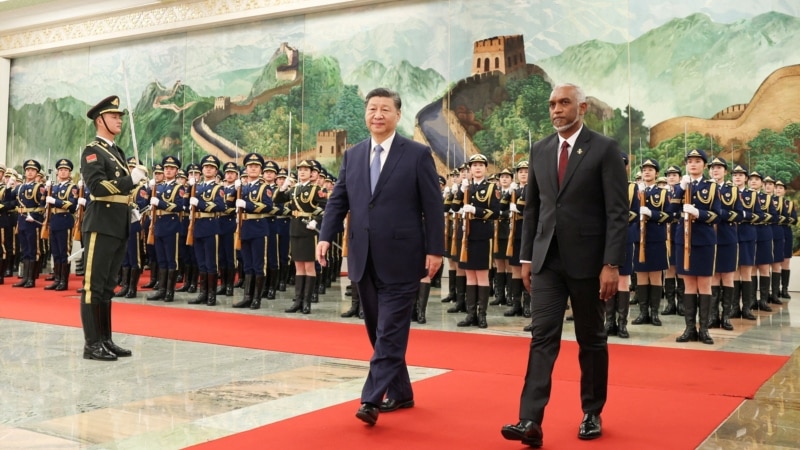In recent weeks, China has stepped up efforts to deepen security ties with Indian Ocean countries, signing a new security agreement with the Maldives and sending military delegations to three regional countries earlier this month.
On March 4, the Ministry of Defense of the Maldives announced that the country had signed a military assistance agreement with China to “promote stronger bilateral relations.” The ministry did not elaborate on the details of the agreement.
The Chinese Ministry of National Defense also sent a military delegation to the Maldives, Sri Lanka and Nepal for a 10-day visit earlier this month.
According to the Ministry of National Defense, the delegation met with Maldivian President Mohamed Muizou and defense officials from the three countries to discuss “regional security issues of common concern”, develop bilateral military relations and promote bilateral defense cooperation.
These developments come as India begins withdrawing about 80 security personnel stationed in the Maldives at Muizum’s request. Indian security personnel are deployed to the archipelago, operating helicopters and other aircraft on surveillance or rescue missions.
Previously, a Chinese scientific research ship visited the Maldives last month. Increased activity by Chinese research vessels in the Indian Ocean over the past few months has raised security concerns in India, which fears Beijing may deploy naval vessels to the region based on insights gained from these activities.
Some analysts say recent developments in the Indian Ocean are part of China’s long-term efforts to strengthen its regional security presence. “China has been doing this for about 15 years and has been taking an opportunistic approach [increase its security presence] In the Indian Ocean,” David Brewster, a senior researcher at the Australian National University, told VOA by phone.
Brewster said China often waits for opportunities to “enhance its position” in certain countries in the Indian Ocean region, rather than focusing on cultivating security relationships with a particular country.
In the case of the Maldives, China “is taking advantage of new [Maldives] The Muizu-led government came to power in November last year, capitalizing on the ‘India is out’ sentiment among many in the country,” he said.
On March 12, Chinese Foreign Ministry spokesperson Wang Wenbin said in response to the withdrawal of Indian security personnel from the Maldives that China “supports the Maldives in safeguarding territorial sovereignty and conducting friendly cooperation with all parties on the basis of independence.”
Brewster said that while the Maldives has stepped up exchanges with China under the new government, it is unclear how big the relationship will be. “The first step in military cooperation [between China and the Maldives] “The relationship is quite mild, and it’s unclear how the bilateral security relationship will develop,” he told VOA.
Even so, some experts say India will remain concerned about China’s growing security presence in the Indian Ocean and will try to counter Beijing’s attempts by expanding its presence or increasing exchanges with its neighbors.
Harsh Pant, vice president for research and foreign policy at India’s Observer Research Foundation, said: “If a power, resources and capabilities like China gain a foothold in the Indian Ocean and South Asia, India’s options will be limited.”
India has taken several steps to strengthen its presence and safeguard its interests in this strategically important region, through which 80% of the world’s seaborne cargo passes.
Earlier this month, India unveiled plans to build a new naval base on Minicoi, the southernmost island in India’s Lakshadweep archipelago, near the Maldives. Pant said New Delhi is also building new facilities in other regional countries such as Mauritius.
“India has its own approach to managing the security transition in the region,” he told VOA by phone. He added that these efforts include delivering projects in neighboring countries, strengthening India’s maritime awareness capabilities, and leveraging partnerships with like-minded democratic Partnerships between countries, such as the United States and Japan.
Australia’s Brewster said the recent developments were part of an ongoing battle for influence between Beijing and New Delhi.
“In any given island nation [in the region,] “It’s like a pendulum swinging back and forth between the influence of India and China,” he told VOA, adding that domestic political changes in regional countries can often create conditions that favor China or India.
Some analysts say that this region will become another area of fierce geopolitical competition among major powers.
Srikant Kondapalli, a professor of Chinese studies at Jawaharlal Nehru University in India, told VOA over the phone: “In the next ten years, China may try to establish more naval bases in the Indian Ocean region. Tactical air support or logistical reinforcements.”
Kondapalli believes that India and its allies may increase the number of naval ships in the Indian Ocean and “piece together” some naval arrangements with regional countries. “We may see some small-scale conflicts and contests in the Indian Ocean region in the future,” he said.
Follow us on Google news ,Twitter , and Join Whatsapp Group of thelocalreport.in
